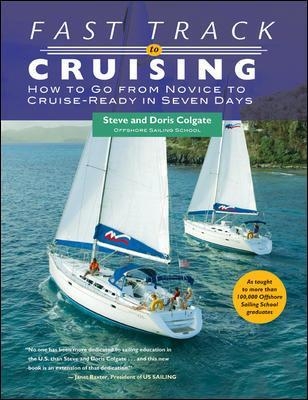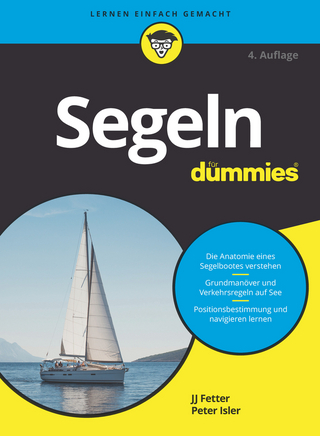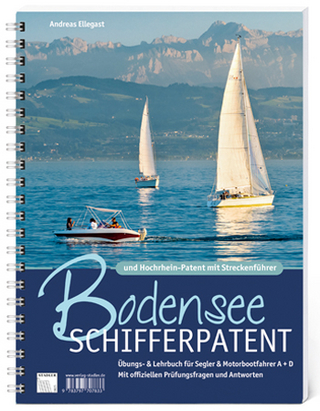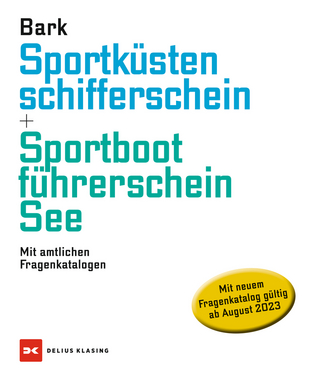
Fast Track to Cruising
International Marine Publishing Co (Verlag)
978-0-07-140672-7 (ISBN)
- Titel z.Zt. nicht lieferbar
- Versandkostenfrei innerhalb Deutschlands
- Auch auf Rechnung
- Verfügbarkeit in der Filiale vor Ort prüfen
- Artikel merken
From first sail to cruising a mid-sized sailboat, here is a how-to book tailored to would-be sailors with big dreams and little timeLike the "Fast Track to Cruising" course, this book starts with the basics of sailing and moves the reader quickly through days ailing to cruising. The first half covers all the steps from learning to sail to live-a-board cruising in outline format, offering synopses of key information along that path. Each key point is cross-linked to a fuller exposition in the second half of the book, helping the reader to a fuller understanding of the concepts behind the techniques.
Steve Colgate founded the Offshore Sailing School in 1964. He has participated in two America’s Cup trials, seventeen Newport-Bermuda races, seven Fastnet Races, the Pan American Games, the Olympics, and six transatlantic races. The Offshore Sailing School operates from four Florida locations (Captiva Island; Ft. Myers Beach; St. Petersburg; and the Florida Keys) and from Chelsea Piers, New York City; Jersey City, NJ; St. Michaels, MD; and the British Virgin Islands. In 2003, US SAILING awarded the Colgates the Timothea Larr Trophy in recognition of their outstanding leadership and excellence in sailing education. Doris Colgate is president and CEO of the Offshore Sailing School and founder of the National Women’s Sailing Association. The Offshore Sailing School operates from four Florida locations (Captiva Island; Ft. Myers Beach; St. Petersburg; and the Florida Keys) and from Chelsea Piers, New York City; Jersey City, NJ; St. Michaels, MD; and the British Virgin Islands. In 2003, US SAILING awarded the Colgates the Timothea Larr Trophy in recognition of their outstanding leadership and excellence in sailing education.
AcknowledgmentsIntroductionDay One: Getting to Know Your BoatChapter 1: The Language of SailingImportant Words to KnowHow to Measure a SailboatHow to Describe a SailboatStanding RiggingRunning RiggingSails and How to Describe ThemChapter 2: Start SailingSailing Comfort is All about PreparationGetting AboardGetting Ready to SailGetting UnderwaySteeringMake Yourself ComfortableChapter 3: The Points of SailFinding Wind DirectionYour Boat is Always on a TackCycling Through the Points of SailChanging Course DownwindSailing toward the WindWhen Tacks Don’t Go as PlannedDay Two: Building Confidence and SkillsChapter 4: Wind and Sails: A Powerful TeamWind Creates LiftTwo Sails are More Efficient than OneThe Effect of HeelingUsing TelltalesWind Flow on a RunJib LeadsHow Sails are MadeSail ControlsReading and Using the WindChapter 5: Balance and StabilityHow Weather and Lee Helm Affect BalanceHow Sails Affect BalanceHow Weight Affects BalanceHow the Keel and Hull Shape Affect StabilityHow to Control StabilityDetermining SpeedSailing DinghiesChapter 6: Handling Heavy Weather and Rescuing CrewSailing in Heavy WeatherWhat to Do in a SquallCrew Overboard!Day Three: Going and Coming with EaseChapter 7: Mooring, Docking and Anchoring Under SailMooring Pickup without a MotorHow to Anchor Under SailHow to Dock Under SailIf You Go AgroundChapter 8: Right-of-Way Rules and NavigationHow to Determine if You are on a Collision CourseRules of the RoadNavigation BasicsDay Four: Getting Familiar with Bigger BoatsChapter 9: Segue to a Cruising BoatCruising LingoLearning the Systems AboardProper Engine UseManeuvering Under PowerChapter 10: Getting UnderwayBefore You LeaveLeave the Dock in StyleSetting SailSafe and Efficient Winch UseTidying Up on DeckChapter 11: Basic Maneuvers Under Sail and PowerWhen and Where to TackHow to Tack a Cruising BoatHow to Jibe a Cruising BoatDousing Sails at Day's EndDay Five: Settling Down for the NightChapter 12: Docking and Mooring a Cruising BoatApproaching a DockPicking Up a MooringMed-Moor DockingHow to Back in from a Preset MooringShutting DownChapter 13: Anchoring Your Cruising BoatAnchors and their Holding PowerWhere to AnchorSetting Your AnchorWhen Two Anchors are BetterAnchoring in Deep WaterSpecial CircumstancesHow to Get Going AgainDay Six: Techniques for Successful CruisingChapter 14: Sail Trim for CruisingHow to Steer ComfortablyWhen Wind Velocity ChangesWhy Sail Shape is ImportantMainsail Control and ShapeProper Genoa TrimControl in Heavy AirChapter 15: Safety and Health Tips for CruisingHow to Avoid Being SeasickOther Health Conditions You Might EncounterEquipment Failures Can Cause AccidentsTips for Going Up a MastWhat to Do if Someone Goes OverboardWhat to Do if You Go AgroundWhat to Do if Steering FailsA Collision Can Ruin Your DaySailing at Night and in Restricted VisibilityDay Seven: Gone Cruising!Chapter 16: Navigation: Knowing Where You Are and Where You Are GoingBecoming a NavigatorHow to Use ChartsWhere You Can and Cannot SailUnderstanding Variation and DeviationWhat is Dead Reckoning?How to Avoid HazardsOther Tips for NavigatingNavigating in CurrentSatellite NavigationChapter 17: Creature Comforts and Other Tips for CruisingYour DinghyUse of Water AboardCooking AboardMarine ToiletsDealing with GarbageSafety BelowTips for Swimming and FishingCommunicating between BoatsChapter 18: Cruise Ready!About Bareboat CharteringWhat to Pack for Your CruiseCustoms and Currency AbroadCruising CourtesyBeyond CharteringAppendix 1: Seven-Day Study ProgramAppendix 2: Tips and ChecklistsGlossaryIndex
| Erscheint lt. Verlag | 16.1.2005 |
|---|---|
| Zusatzinfo | 75 Illustrations |
| Verlagsort | Rockport, ME |
| Sprache | englisch |
| Maße | 226 x 279 mm |
| Gewicht | 607 g |
| Themenwelt | Sachbuch/Ratgeber ► Sport ► Segeln / Tauchen / Wassersport |
| ISBN-10 | 0-07-140672-7 / 0071406727 |
| ISBN-13 | 978-0-07-140672-7 / 9780071406727 |
| Zustand | Neuware |
| Haben Sie eine Frage zum Produkt? |
aus dem Bereich


